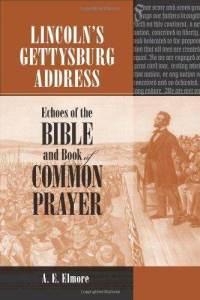“Lincoln’s Gettysburg Address: Echoes of the Bible and Book of Common Prayer”
Author: A. E. Elmore
Publisher: Southern Illinois University Press
Pages: 265
Price: $32.95 (Cloth)
Over the past few years, there has been, upon this continent, a rebirth in public interest in Abraham Lincoln.
Doris Kearns Goodwin in 2006 had a huge success with “Team of Rivals,” her study of the political diversity of Lincoln’s cabinet and his advice-gathering style, and now the movie “Lincoln,” which focuses on the difficulties of passing the amendment guaranteeing emancipation, is filling the theaters and is nominated for numerous awards.
Clearly, Lincoln is much thought about and written about.
But, as Al Elmore, a professor at Athens State, reminds us in his study of the Gettysburg Address, with Lincoln it has always been so: “more books have been written about him than any other person in history except Jesus Christ and William Shakespeare.”
In fact there have been a number of books studying Lincoln’s reading, his rhetorical style, his writings of all kinds, including studies of the Gettysburg Address itself, and Elmore acknowledges and cites them.
But Elmore’s concerns are even more specific.
He traces and explains, sentence by sentence (and there are only ten sentences), indeed, phrase by phrase, the sources of the Gettysburg Address, delivered on November 19, 1863, which he calls “the most famous speech ever written by anyone” and “a national treasure.” Lincoln’s sources include a lecture by Theodore Parker (for the origin of the phrase “of the people, by the people and for the people,” which Lincoln sharpened) the plays of William Shakespeare, Euclidean geometry (for the word “proposition”), the Declaration of Independence and the United States Constitution, as well as political writings and speeches by American statesmen going back to the Revolution.
Elmore asserts that Lincoln’s reading, since he had little formal schooling, was narrow but very deep and that he had an extraordinary memory. What he read, he knew. But Elmore’s focus is on the references and allusions to the Bible and The Book of Common Prayer. These two documents provide the bulk of Lincoln’s allusions and it is not by chance.
Elmore argues that the primary, the controlling metaphor of the Gettysburg Address was also taken from the New Testament and to a lesser degree, the Declaration of Independence—that is, the metaphor of birth, death and rebirth. Lincoln uses the phrase “conceived in liberty” to connect the nation’s struggles to the birth, death and resurrection of Jesus, who will not only enjoy eternal life Himself, but whose sacrifice makes it possible for His believers.
In Lincoln’s analogy, the U.S., born at the Declaration, has been endangered by the rebellion and now may be saved through the sacrifice of the dead at Gettysburg; the nation, born again, shall not perish from the earth.
Lincoln chose the Declaration over the Constitution primarily because Jefferson’s Declaration contains the all-important phrase “We hold these truths to be self-evident, that all men are created equal.” The Confederacy rejected this proposition and preferred the debating grounds of states’ rights which could be argued from the Constitution.
Not all readers may agree, but Elmore believes that although Lincoln and Jefferson were in fundamental agreement politically, and used many of the same sources of inspiration, Lincoln is the better, more poetic, writer. Jefferson’s allusions, he says are “far less subtle” and while readers may remember the ideas, the meaning of Jefferson’s writings, “most readers …remember the actual words of Lincoln.”
Lincoln also made numerous allusions to The Book of Common Prayer, Elmore asserts, knowing that this was language well known to the Confederate leadership, “who venerated the words of the Prayer Book.” Citing Glenn Robins’ biography of Bishop/Confederate General Leonidas Polk, we are reminded that 32% of the delegates to secessionist conventions were Episcopalians, including Jefferson Davis, secretaries of the Treasury and the Navy and seven of the eight full generals.
“In summary,” Robins says, “Southern Episcopalians expressed the values of the Southern slave society.”
Lincoln, then, is “echoing a Prayer Book better known and more beloved by his enemies than his friends.”
A.E. Elmore, who holds both a PhD in English from Vanderbilt and a law degree, has worked as a public defender in Las Vegas and taught criminal law at the University of Alabama Law School. He is presently teaching literature, drama and law at Athens State University and combines his skills as a close reader with a most thorough arguing of his case. If, as reader, I am juror, I am convinced.
This review was originally broadcast on Alabama Public Radio. Don Noble is host of the Alabama Public Television literary interview show “Bookmark” and the editor of “A State of Laughter: Comic Fiction from Alabama.”

 DeMott
DeMott